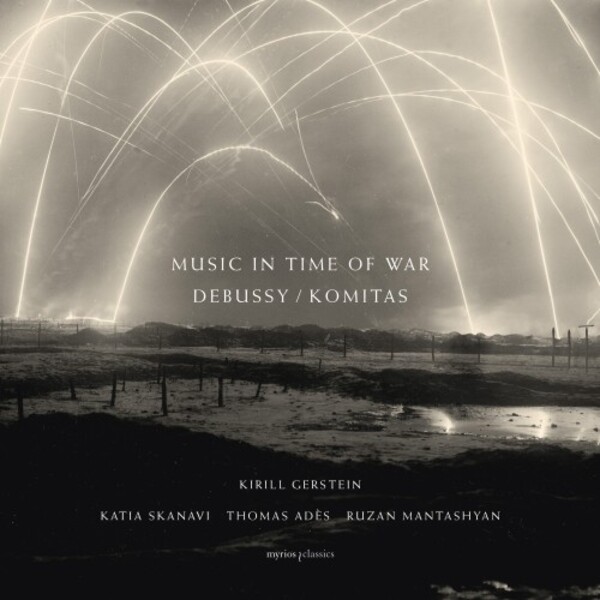DEBUSSY; KOMITAS 'Music in Time of War'
View record and artist detailsRecord and Artist Details
Genre:
Instrumental
Label: Myrios
Magazine Review Date: 06/2024
Media Format: CD or Download
Media Runtime: 141
Mastering:
DDD
Catalogue Number: MYR905

Tracks:
| Composition | Artist Credit |
|---|---|
| (12) Etudes |
Claude Debussy, Composer
Kirill Gerstein, Piano |
| Armenian Dances |
Komitas Vardapet, Composer
Kirill Gerstein, Piano |
| (3) Chansons de Bilitis |
Claude Debussy, Composer
Kirill Gerstein, Piano Ruzan Mantashyan, Soprano |
| (6) Epigraphes antiques |
Claude Debussy, Composer
Katia Skanavi, Piano Kirill Gerstein, Piano |
| Armenian Songs |
Komitas Vardapet, Composer
Kirill Gerstein, Piano Ruzan Mantashyan, Soprano |
| Noël des enfants qui n'ont plus de maisons |
Claude Debussy, Composer
Kirill Gerstein, Piano Ruzan Mantashyan, Soprano |
| Pièce pour l'oeuvre du ‘Vêtement du blessé' |
Claude Debussy, Composer
Kirill Gerstein, Piano |
| Berceuse héroïque |
Claude Debussy, Composer
Kirill Gerstein, Piano |
| Etude retrouvée |
Claude Debussy, Composer
Kirill Gerstein, Piano |
| Elégie |
Claude Debussy, Composer
Kirill Gerstein, Piano |
| (Les) soirs illuminés par l'ardeur du charbon |
Claude Debussy, Composer
Kirill Gerstein, Piano |
| En blanc et noir |
Claude Debussy, Composer
Kirill Gerstein, Piano Thomas Adès, Piano |
Author: Peter J Rabinowitz
This recording originated in Kirill Gerstein’s pandemic study of Debussy’s Études, but it’s also grounded in his recognition that we are ‘surrounded by war and genocide’. He’s thus chosen to illuminate the music by emphasising ‘the historical and cultural setting in which it was created and received’. He does this in two ways, situating the cycle in the context of the First World War and, simultaneously, holding it up against the very different music written around the same time by composer and ethnomusicologist Komitas, who spent his final years in a psychiatric hospital traumatised by the Armenian Genocide.
The inspired programming – supported by a richly illustrated book containing texts, translations and essays by several hands – raises the emotional stakes. The representation of homelessness in Debussy’s Noël des enfants qui n’ont plus de maisons is always powerful; but hearing it with Komitas’s Antuni (‘Homeless’) – as at its premiere, a fundraiser for Genocide victims – amplifies the sense of dislocation.
At the same time, the programming complicates the intellectual stakes, since those two contexts reveal very different things about the Études. On the one hand, placing them next to Komitas’s rough, folk-derived Dances – with their spare textures, their structural clarity, their hypnotic reliance on repetition – highlights Debussy’s refinement, including his harmonic nuance and formal intricacy. At the same time, placing the Études in the context of the war counteracts that abstraction by bringing out their underlying mournfulness, encouraging interpretations that are darker, less angular and lonelier than usual (listen, as but one example, to the unusually poignant reading of ‘Pour les sixtes’).
As an added consequence, Gerstein’s juxtaposition underscores the relationship between the Études and Debussy’s other late music, especially his more explicitly war-influenced works, many of which are often dismissed as inconsequential but which here emerge as powerful evocations of a broken time.
Throughout this ear-opening experience, Gerstein offers his expected interpretative virtues: his gorgeous tone, his artful rubato (listen to the poignant longing in ‘Pour les tierces’), his unfailing virtuosity. Some might find his Debussy too soft-focus at times (his Komitas is sharper and more rhythmically vital). But even those who prefer the spiky intensity of Pollini (DG, 3/94) or the volatile imagination of Bavouzet (Chandos, 12/08) are likely to admire the discernment behind Gerstein’s project.
He has chosen sympathetic partners, too. Both Katia Skanavi and Thomas Adès offer striking unanimity without ever turning mechanical, perfectly matching Gerstein’s vision of the music’s rhythms and its shifts in mood. As for soprano Ruzan Mantashyan, making what appears to be her recording debut: she has appeared as Mimì, Tatyana and Countess Almaviva, among others; and her fluid, sorrowful performance of the Chansons de Bilitis (out of place chronologically but included because Debussy performed it often in war relief concerts) reveals her potential as Mélisande, too. Even better, though, are her desolate performances of the Komitas songs, with their tight, expressive vibrato and their uncanny shaping of the music’s melismatic curves. Spacious engineering only adds to the pleasures of a significant release.
Discover the world's largest classical music catalogue with Presto Music.

Gramophone Digital Club
- Digital Edition
- Digital Archive
- Reviews Database
- Full website access
From £8.75 / month
Subscribe
Gramophone Full Club
- Print Edition
- Digital Edition
- Digital Archive
- Reviews Database
- Full website access
From £11.00 / month
Subscribe
If you are a library, university or other organisation that would be interested in an institutional subscription to Gramophone please click here for further information.




